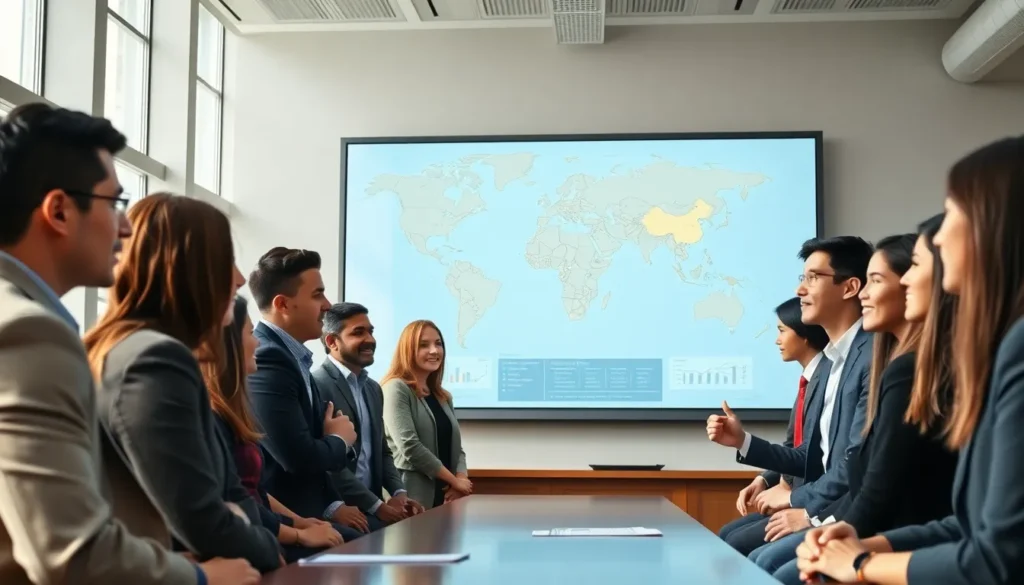Table of Contents
ToggleIn an age where global interactions define our daily lives, a Master’s in Global Affairs stands as a golden ticket to understanding the intricate dance of politics, economics, and culture on a worldwide scale. Imagine being that person who can not only navigate the complexities but also influence change across borders. Sounds exciting, right? This isn’t just a degree: it’s a gateway to make a meaningful impact in a rapidly evolving world. Buckle up as we investigate into the fascinating realm of global affairs, exploring what these programs entail and what opportunities await those who dare to take the plunge.
Understanding Global Affairs Programs

Global affairs programs offer students an interdisciplinary education that combines political science, economics, international relations, and sociology. These curriculums are designed to equip students with a comprehensive understanding of how global systems function. During their studies, students investigate issues like human rights, trade, and environmental challenges that cross national boundaries.
Besides, many institutions incorporate experiential learning through internships, enabling students to gain practical insights. Such opportunities can enhance their academic experience, offering a direct line to the working world. Eventually, these programs prepare graduates to tackle the pressing issues of the day, fostering analytical and critical thinking skills essential for success in this dynamic field.
As they sift through various programs, prospective students may find that each institution offers a unique approach to global affairs. Venturing into this field, one should consider the specific themes and methodologies emphasized in different programs.
Core Curriculum and Key Courses
Understanding the core curriculum is crucial for anyone considering a Master’s in Global Affairs. Typically, these programs consist of both required courses and electives. Core courses often include topics such as:
- International Relations Theory
- Global Governance
- International Economics
- Human Security
- Research Methodologies
Each of these subjects plays a vital role in providing a well-rounded understanding of global affairs. For instance, International Relations Theory helps students grasp the theoretical frameworks that shape global interactions, while Global Governance dives into the operations of international organizations.
Elective courses vary widely, allowing students to tailor their education based on personal interests. They might explore areas like climate change policy, international development, or cybersecurity, each a vital piece of today’s global puzzle. Such flexibility ensures that students are not only educated but also passionate about the fields they choose to investigate into.
Career Opportunities with a Masters In Global Affairs
A Master’s in Global Affairs opens up a treasure trove of career opportunities. Graduates commonly find themselves working in government, non-profit organizations, and multinational corporations. Here are a few typical career paths:
- Foreign Service Officer: Representing a country abroad, these professionals navigate international relations at the governmental level.
- International Development Specialist: They work on projects that aim to improve the quality of life in developing countries, addressing issues from healthcare to education.
- Policy Analyst: Often employed by think tanks, they research and analyze policies, providing valuable insights to shape future legislation.
- Global Communications Manager: Focusing on international messaging and branding, these professionals ensure that communication strategies resonate across cultures.
Jobs in global affairs are not just about traditional roles, though. Emerging fields like cybersecurity and environmental advocacy are creating exciting new opportunities for graduates who think outside the box.
Top Institutions Offering Masters In Global Affairs
When it comes to pursuing a Master’s in Global Affairs, several institutions stand out. Here’s a roundup of some of the most esteemed programs:
- Columbia University: Known for its School of International and Public Affairs (SIPA), Columbia offers a rigorous curriculum that emphasizes real-world applications.
- Georgetown University: The School of Foreign Service has a storied history and provides a comprehensive approach to global policy and security.
- Johns Hopkins University: With its School of Advanced International Studies (SAIS), it focuses on international relations and economics, giving students a competitive edge.
- London School of Economics: In the UK, LSE offers a globally recognized program that attracts students from around the world, making for a diverse and enriching environment.
Each of these institutions boasts unique strengths, whether it’s faculty expertise, networking opportunities, or geographic context. Choosing the right program depends greatly on personal career goals and interests.
Admissions Requirements and Application Tips
Navigating the application process for a Master’s in Global Affairs requires attention to detail. While specific requirements can vary by institution, several common elements emerge. Most programs will request:
- A bachelor’s degree from an accredited institution.
- Letters of recommendation, usually from academic or professional contacts.
- A statement of purpose outlining the applicant’s career goals and interest in global affairs.
- Relevant work or volunteer experience can make candidates stand out.
For successful applications, prospective students should also prepare for interviews, if required. Demonstrating a passion for global issues and clear leadership abilities can leave a lasting impression. Tailoring each application to reflect a genuine interest in the program’s strengths will also help candidates rise above the competition.





